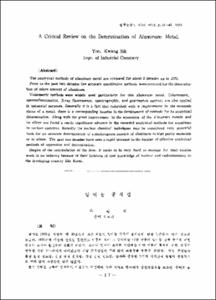국제 환경규제와 국가 환경규제의 연계
- Alternative Title
- The Linkage of Air Pollution Regulations between International and National Levels
- Abstract
- 1992년 6월 'UN 환경개발회의'에서 '기후변화협약'이 채택된 후, 대기오염으로 비롯되는 지구환경문제 해결을 위한 국제적인 노력은 상당히 빠른 속도로 진전되고 있다. 특히 선진국을 중심으로 그린라운드가 진행되면서 지구환경보전을 위한 국제적인 규제활동이 국내의 다양한 정책분야에 큰 영향을 미치게 되었다. 국제적 환경규제 활동이 단순한 외교적 화두에 그치는 것이 아니라, 환경정책과 경제정책을 비롯한 국내의 주요 정책에 지대한 영향을 미치는 상황이 현실로 등장하게 된 것이다. 이러한 점을 고려하여 이 글에서는 국제적인 환경규제와 국내의 환경규제의 연계 현황을 살펴보고 그 가능성을 모색해 보고 있다. 이를 위해 우선 국제적 환경규제 활동이 국내의 환경규제에 미치는 영향을 파악하고, 지구 환경 보전을 위해 국제적인 차원에서 논의되고 있는 환경협약의 내용에 우리나라가 어떻게 대응하고 있는가를 살펴보았으며, 또한 국제적 환경보전을 위한 정책수단들과 제도들이 우리나라에 어느 정도 수용 또는 연계가능성이 있는지를 탐색하였다.
Air pollution problem has been one of the most urgent global environmental problems since UN Framework Convention on Climate Change accepted in Rio Conference, 1992. International environmental regulations of global community to reduce the green house gases have influenced the domestic environmental policies. This paper attempted to identify these influences to enhance the linkage of air pollution regulations between international and national levels, which is necessary for the success of domestic environmental policies. In this article, I reviewed the reponses of Korean Government to the international environmental negotiations and searched for the acceptability and feasibility of the main policy instruments such as carbon tax, emission trading, which have been discussed in international environmental negotiations.
Air pollution problem has been one of the most urgent global environmental problems since UN Framework Convention on Climate Change accepted in Rio Conference, 1992. International environmental regulations of global community to reduce the green house gases have influenced the domestic environmental policies. This paper attempted to identify these influences to enhance the linkage of air pollution regulations between international and national levels, which is necessary for the success of domestic environmental policies. In this article, I reviewed the reponses of Korean Government to the international environmental negotiations and searched for the acceptability and feasibility of the main policy instruments such as carbon tax, emission trading, which have been discussed in international environmental negotiations.
- Issued Date
- 2002
- Type
- Research Laboratory
- Alternative Author(s)
- Jung, Joon Keum
- Publisher
- 사회과학논집
- Language
- kor
- Rights
- 울산대학교 저작물은 저작권에 의해 보호받습니다.
- Citation Volume
- 12
- Citation Number
- 1
- Citation Start Page
- 163
- Citation End Page
- 182
- Appears in Collections:
- Research Laboratory > Journal of social science
- 파일 목록
-
-
Download
 000002025137.pdf
기타 데이터 / 994.66 kB / Adobe PDF
000002025137.pdf
기타 데이터 / 994.66 kB / Adobe PDF
-
Items in Repository are protected by copyright, with all rights reserved, unless otherwise indicated.